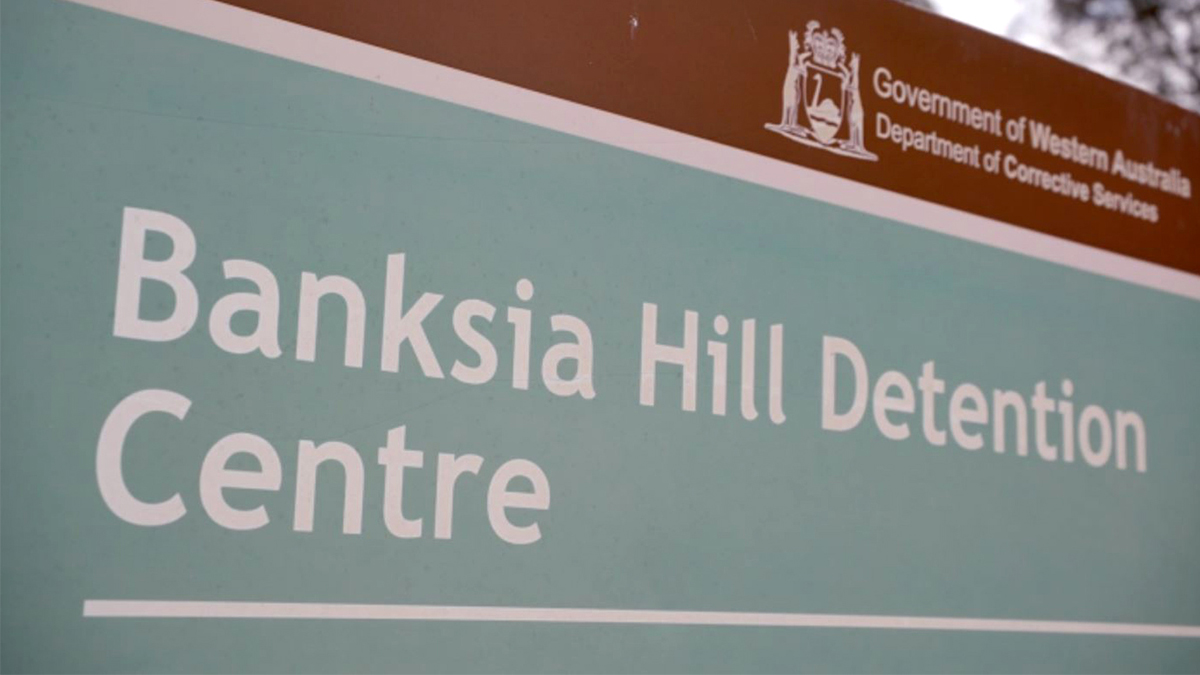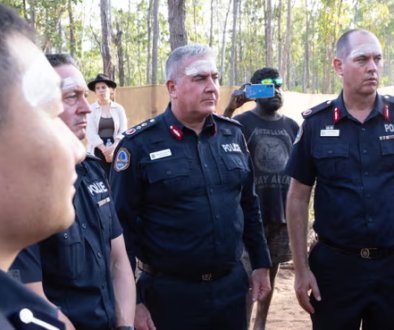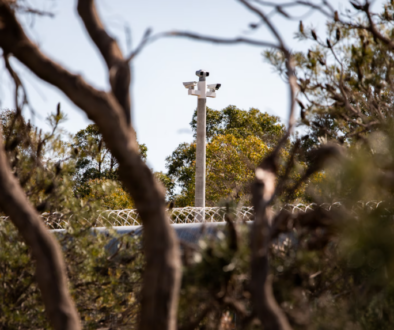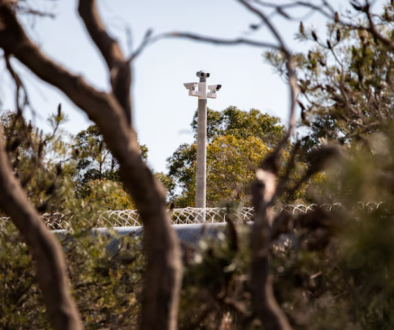
Banksia Hill Detention Centre “a tinderbox ready to ignite” lawyers warn WA Government
Originally published on NIT written by Giovanni Torre
Please note: This story contains reference to someone who has died and contains details readers may find distressing.
Banksia Hill Detention Centre is a “tinderbox ready to ignite”, the law firm spearheading a prospective class action on behalf of current and former detainees has warned the WA Government.
In a letter delivered to Minister for Corrective Services Bill Johnston on 28 October, Levitt Robinson Solicitors warned that the children’s prison was on the brink of upheavals like those in 2013 and 2017.
The letter detailed what it described as “inhumane treatment and lack of services” in Banksia Hill.
“Detainees are… being locked in their cells for up to 8 hours a day [during the day] – with no access to services including: education, programs, or psycho-social support. Meals are served through a grille on the door and eaten alone in the cell,” it read.
“An email from a BHDC case manager to a concerned parent of one detainee, refers to ‘rolling lockdown’ and acknowledges that the ‘kids missing out on services’.”
“One detainee has recorded the number of lockdowns over the last 2 weeks: October 7th, 8th, 11th, 12th, 13th, 14th 2021, stating ‘lockdown means we can’t leave the cell, no school and meals in cell’,” the letter states.
Levitt Robinson alleged there had been “at least seven attempted suicides” over the few weeks leading up to the letter, and “countless incidents of serious self-harm”, including a child self-harming while under observation.
The firm stated that roughly two thirds of the Youth Justice Officers at Banksia Hill “are absent from work on extended stress-related leave, or have resigned, citing intolerable conditions”.
The letter notes reports by Auditors General, the Australian Law Reform Commission, the Australian Institute of Health and Welfare, and the Office of Inspector of Custodial Services Reports have put Youth Justice Services “on notice of its many failures to provide an environment that complies with both Australian and international legal standards”.
“The substance of those allegations has since been corroborated by publicly available reports and statistics from statutory bodies… [and] the 400+ ex-detainees who have provided detailed accounts of their time in BHDC,” they wrote.
Levitt Robinson warned that with the majority of detainees at Banksia Hill being “disadvantaged Indigenous children, mainly, if not most, with a disability”, the West Australian Government is “exposed to compensatory litigation for breaches of Commonwealth legislation crafted to protect against… discrimination”.
The firm advised National Indigenous Times it expects the number of individual group members in the prospective action to soon exceed 500.
Gerry Georgatos and Megan Krakouer of the National Suicide Prevention & Trauma Recovery Project began the process of building the class action in 2020, after doing two months of outreach work in Banksia Hill.
“100 per cent of the detainees have a story unimaginable to most Australians. They have been born into disadvantage and suffering… What galvanised that we would go forward with the class action – is that we could not stand to see the most vulnerable children go through that,” Georgatos said.
Lawyer Dana Levitt told the National Indigenous Times that former Banksia detainees and the parents of Banksia detainees with whom she has spoken gave accounts of a dire situation.
“There have been many incidents where kids are left to self-harm in their cells, in one case even told “to do what they’ve got to do”. Injuries… are given no attention, medical or otherwise. The permanent medical staff at BHDC seems limited to two nurses,” she said.
“Kids kept at Intensive Support Unit for prolonged periods return covered in wounds and scratches, disassociated, or drugged out… There are worse places than ISU, like the aptly named ‘Cage’, which is made of metal wire and open to the elements.”
“The treatment these kids are receiving amounts to torture and offends against every ‘best interest principle’, not to mention the objectives of the Young Offenders Act, as it applies to the use of youth detention ‘as a last resort’.
“Children are placed in ISU… OICS [Office of the Inspector of Custodial Services] called it ‘counter-therapeutic and totally at odds with the trauma informed model of care’. And yet, what is being done? Nothing.”
Levitt said that to pass time while in lockdown the children have “four TV channels, a toilet and a bed”.
“You can imagine how deleterious this is for all children, but particularly the 9 out of 10 children in BHDC with cognitive impairment or mental disorder,” she said.
“If these children were disadvantaged before they got to BHDC, they leave worse off.”
Tessa (not her real name) lives in the Kimberley region. Her 15-year-old son is currently in Banksia Hill for the second time.
“This time has been worse than the last. There are 15-hour lockdowns, no school,” she told the National Indigenous Times.
“When he was in the first time he had school every day, he had a routine… Now they have no school, no educators coming to see them. They would be lucky to go to school once a fortnight, or to get let out for recreation, basketball once a fortnight.”
According to the Office of the Inspector of Custodial Services 2020 report Banksia Hill detainees “had an average of only 9–10 out of cell hours” per day – leaving a balance of 14-15 hours per day in their cells, in 2020.
The Department of Justice did not provide data for 2021.
Tessa’s son recently self-harmed. In the interest of the responsible reporting of self-harm, the National Indigenous Times will not publish details, but can report that it involved significant injuries.
“They put him straight into the isolation unit. They see a doctor but they don’t see a psychologist or psychiatrist until their usual appointment, which is once a week… While in ISU you are not allowed to make phone calls, there’s constant monitoring. He told me… they do nothing all day.
“Whenever I ask them what’s going on, they say ‘we don’t have enough staff’.”
Tessa said there have been “many attempted suicides and self-harm incidents… it is through the roof”.
Her eldest children live in Perth and try to visit their brother every week.
“The majority of the boys are from the Pilbara and the Kimberley; they have no family contact. You have to jump through hoops to do a video call, and the majority of these families are so remote, it’s really hard,” she said.
“My son has self-harmed four times in there. After the third time, they didn’t notify me. They apologised and said it was because of staffing.”
Aunty Carol Roe, whose granddaughter Ms Dhu was killed in custody by neglect in 2014, has had two grandsons in Banksia Hill and said the prison is “getting worse”.
“If your kids go to jail you don’t know if they are going to walk out. I am frightened by it… Kids get killed in prison and the police get promoted. They kill a black person and they get promoted. It’s a terrible thing to say, but it happens.”
Roe said one of the first things that must be done is raising the age of criminal responsibility.
“Stop locking up 10 year-old children, that is the biggest priority. They go to jail, they get molested, even get killed… Kids go out and make mistakes, and some people can’t handle their children – but they should not be going to jail,” she said.
A spokesperson for the Department of Justice provided data on self-harm and attempted suicide from the periods July 2018-June 2019 with July 2019-June 2020.
The data showed a decrease in instances of minor self-harm incidents from 145 to 113, an increase in serious self-harm from zero to one case, and a drop from two attempted suicides to one. No data was made available for the second half of 2020 or for 2021 to date.
The spokesperson said detainees “are usually provided education on every weekday during school terms and this term has been no exception”.
They said the Department “provides a range of rehabilitation and support services for detainees” and former detainees, adding that “health, rehabilitative, recreational, cultural and educational programs” are delivered by staff and externally contracted providers.
The spokesperson said Banksia Hill “also provides Aboriginal Welfare Officers to provide onsite support, advocacy and family connection”, and that “young people held in the ISU have access to the same services provided other young people at Banksia Hill”.
Georgatos said the testimonies from detainees and former detainees “are harrowing, they are staggering”.
“Each story is individual but there are significant intersections that make it very hard for any court to dispute… I have worked with children living below the poverty line all my life and I have never seen more vulnerable children than those I’ve seen in juvenile detention.”
Georgatos noted that while most jurisdictions in Australia have multiple juvenile detention centres, Western Australia has one – meaning children from all over the state serve time there.
“70 per cent of them will go on to adult incarceration later in their lives, consuming most of their 20s and 30s. This is a huge failure.”
Data from 2020 confirms that 73.6 per cent of juveniles detained in Western Australia were Indigenous, compared to 48 per cent on average nationwide.
More broadly, Western Australia has the highest number of Indigenous people in prison per capita of any jurisdiction in the country.
Data from 2020 also shows that while on average Indigenous children in Australia are 17 times more likely to be in detention than non-Indigenous children, in Western Australia they are 34 times more likely to be in detention.
Tessa told the National Indigenous Times that the situation in Banksia Hill is “worse than in adult prisons”.
“They need to have more staff. And the boys haven’t even been sentenced; every single child in there from the Kimberley are on remand. They need to be sentenced and sent home. They are off Country, they have no cultural connection, no one visiting them – nothing down there,” she said.
“The last time I talked to my son he said there are boys trying to kill themselves every day in there because they are isolated and have no connections.”

Banksia Hill Detention Centre “a tinderbox ready to ignite” lawyers warn WA Government
Originally published on NIT written by Giovanni Torre
Please note: This story contains reference to someone who has died and contains details readers may find distressing.
Banksia Hill Detention Centre is a “tinderbox ready to ignite”, the law firm spearheading a prospective class action on behalf of current and former detainees has warned the WA Government.
In a letter delivered to Minister for Corrective Services Bill Johnston on 28 October, Levitt Robinson Solicitors warned that the children’s prison was on the brink of upheavals like those in 2013 and 2017.
The letter detailed what it described as “inhumane treatment and lack of services” in Banksia Hill.
“Detainees are… being locked in their cells for up to 8 hours a day [during the day] – with no access to services including: education, programs, or psycho-social support. Meals are served through a grille on the door and eaten alone in the cell,” it read.
“An email from a BHDC case manager to a concerned parent of one detainee, refers to ‘rolling lockdown’ and acknowledges that the ‘kids missing out on services’.”
“One detainee has recorded the number of lockdowns over the last 2 weeks: October 7th, 8th, 11th, 12th, 13th, 14th 2021, stating ‘lockdown means we can’t leave the cell, no school and meals in cell’,” the letter states.
Levitt Robinson alleged there had been “at least seven attempted suicides” over the few weeks leading up to the letter, and “countless incidents of serious self-harm”, including a child self-harming while under observation.
The firm stated that roughly two thirds of the Youth Justice Officers at Banksia Hill “are absent from work on extended stress-related leave, or have resigned, citing intolerable conditions”.
The letter notes reports by Auditors General, the Australian Law Reform Commission, the Australian Institute of Health and Welfare, and the Office of Inspector of Custodial Services Reports have put Youth Justice Services “on notice of its many failures to provide an environment that complies with both Australian and international legal standards”.
“The substance of those allegations has since been corroborated by publicly available reports and statistics from statutory bodies… [and] the 400+ ex-detainees who have provided detailed accounts of their time in BHDC,” they wrote.
Levitt Robinson warned that with the majority of detainees at Banksia Hill being “disadvantaged Indigenous children, mainly, if not most, with a disability”, the West Australian Government is “exposed to compensatory litigation for breaches of Commonwealth legislation crafted to protect against… discrimination”.
The firm advised National Indigenous Times it expects the number of individual group members in the prospective action to soon exceed 500.
Gerry Georgatos and Megan Krakouer of the National Suicide Prevention & Trauma Recovery Project began the process of building the class action in 2020, after doing two months of outreach work in Banksia Hill.
“100 per cent of the detainees have a story unimaginable to most Australians. They have been born into disadvantage and suffering… What galvanised that we would go forward with the class action – is that we could not stand to see the most vulnerable children go through that,” Georgatos said.
Lawyer Dana Levitt told the National Indigenous Times that former Banksia detainees and the parents of Banksia detainees with whom she has spoken gave accounts of a dire situation.
“There have been many incidents where kids are left to self-harm in their cells, in one case even told “to do what they’ve got to do”. Injuries… are given no attention, medical or otherwise. The permanent medical staff at BHDC seems limited to two nurses,” she said.
“Kids kept at Intensive Support Unit for prolonged periods return covered in wounds and scratches, disassociated, or drugged out… There are worse places than ISU, like the aptly named ‘Cage’, which is made of metal wire and open to the elements.”
“The treatment these kids are receiving amounts to torture and offends against every ‘best interest principle’, not to mention the objectives of the Young Offenders Act, as it applies to the use of youth detention ‘as a last resort’.
“Children are placed in ISU… OICS [Office of the Inspector of Custodial Services] called it ‘counter-therapeutic and totally at odds with the trauma informed model of care’. And yet, what is being done? Nothing.”
Levitt said that to pass time while in lockdown the children have “four TV channels, a toilet and a bed”.
“You can imagine how deleterious this is for all children, but particularly the 9 out of 10 children in BHDC with cognitive impairment or mental disorder,” she said.
“If these children were disadvantaged before they got to BHDC, they leave worse off.”
Tessa (not her real name) lives in the Kimberley region. Her 15-year-old son is currently in Banksia Hill for the second time.
“This time has been worse than the last. There are 15-hour lockdowns, no school,” she told the National Indigenous Times.
“When he was in the first time he had school every day, he had a routine… Now they have no school, no educators coming to see them. They would be lucky to go to school once a fortnight, or to get let out for recreation, basketball once a fortnight.”
According to the Office of the Inspector of Custodial Services 2020 report Banksia Hill detainees “had an average of only 9–10 out of cell hours” per day – leaving a balance of 14-15 hours per day in their cells, in 2020.
The Department of Justice did not provide data for 2021.
Tessa’s son recently self-harmed. In the interest of the responsible reporting of self-harm, the National Indigenous Times will not publish details, but can report that it involved significant injuries.
“They put him straight into the isolation unit. They see a doctor but they don’t see a psychologist or psychiatrist until their usual appointment, which is once a week… While in ISU you are not allowed to make phone calls, there’s constant monitoring. He told me… they do nothing all day.
“Whenever I ask them what’s going on, they say ‘we don’t have enough staff’.”
Tessa said there have been “many attempted suicides and self-harm incidents… it is through the roof”.
Her eldest children live in Perth and try to visit their brother every week.
“The majority of the boys are from the Pilbara and the Kimberley; they have no family contact. You have to jump through hoops to do a video call, and the majority of these families are so remote, it’s really hard,” she said.
“My son has self-harmed four times in there. After the third time, they didn’t notify me. They apologised and said it was because of staffing.”
Aunty Carol Roe, whose granddaughter Ms Dhu was killed in custody by neglect in 2014, has had two grandsons in Banksia Hill and said the prison is “getting worse”.
“If your kids go to jail you don’t know if they are going to walk out. I am frightened by it… Kids get killed in prison and the police get promoted. They kill a black person and they get promoted. It’s a terrible thing to say, but it happens.”
Roe said one of the first things that must be done is raising the age of criminal responsibility.
“Stop locking up 10 year-old children, that is the biggest priority. They go to jail, they get molested, even get killed… Kids go out and make mistakes, and some people can’t handle their children – but they should not be going to jail,” she said.
A spokesperson for the Department of Justice provided data on self-harm and attempted suicide from the periods July 2018-June 2019 with July 2019-June 2020.
The data showed a decrease in instances of minor self-harm incidents from 145 to 113, an increase in serious self-harm from zero to one case, and a drop from two attempted suicides to one. No data was made available for the second half of 2020 or for 2021 to date.
The spokesperson said detainees “are usually provided education on every weekday during school terms and this term has been no exception”.
They said the Department “provides a range of rehabilitation and support services for detainees” and former detainees, adding that “health, rehabilitative, recreational, cultural and educational programs” are delivered by staff and externally contracted providers.
The spokesperson said Banksia Hill “also provides Aboriginal Welfare Officers to provide onsite support, advocacy and family connection”, and that “young people held in the ISU have access to the same services provided other young people at Banksia Hill”.
Georgatos said the testimonies from detainees and former detainees “are harrowing, they are staggering”.
“Each story is individual but there are significant intersections that make it very hard for any court to dispute… I have worked with children living below the poverty line all my life and I have never seen more vulnerable children than those I’ve seen in juvenile detention.”
Georgatos noted that while most jurisdictions in Australia have multiple juvenile detention centres, Western Australia has one – meaning children from all over the state serve time there.
“70 per cent of them will go on to adult incarceration later in their lives, consuming most of their 20s and 30s. This is a huge failure.”
Data from 2020 confirms that 73.6 per cent of juveniles detained in Western Australia were Indigenous, compared to 48 per cent on average nationwide.
More broadly, Western Australia has the highest number of Indigenous people in prison per capita of any jurisdiction in the country.
Data from 2020 also shows that while on average Indigenous children in Australia are 17 times more likely to be in detention than non-Indigenous children, in Western Australia they are 34 times more likely to be in detention.
Tessa told the National Indigenous Times that the situation in Banksia Hill is “worse than in adult prisons”.
“They need to have more staff. And the boys haven’t even been sentenced; every single child in there from the Kimberley are on remand. They need to be sentenced and sent home. They are off Country, they have no cultural connection, no one visiting them – nothing down there,” she said.
“The last time I talked to my son he said there are boys trying to kill themselves every day in there because they are isolated and have no connections.”



